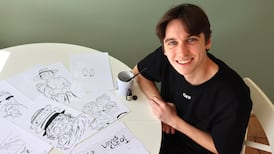
Do you ever wonder how a memory forms? Does it crystallise, images tightly bound by place or time, a seed, an acorn to a mighty oak tree, the branches of interconnectivity: “Remember this, remember that, remember when, remember them?”
I never use the word remember in conversation with Mum.
How does a memory take root safely so that it sustains, deep and permanent within the structures of the brain? An archive of our past neatly filed away for reference later. A map: the who and why and where of every part of us.
Do you ever wonder how long it lasts: that memory, once planted? I used to: I used to guess at how far back my mother could remember. Twenty years? Thirty? Dementia sweeps an eraser across the blackboard where her story was written; it laid waste to the most recent first: her grandchildren, first, then her children, my father. We are all dust.
Sparking innovation in healthcare: From virtual reality for pain to digital diagnostic systems
Dementia: 12% fewer beds for patients, as rates of condition set to double by 2050
Could vagus nerve stimulation be used to treat obesity, Alzheimer’s and bowel disorders?
Dementia and AI: ‘I’ve never seen something quite like this’
But every day now, the memories I used to imagine she might still be able to form, die faster. There’s nothing to nurture them. They are shallow and weak and easily pulled.
I know what she is doing: she is willing me to cancel, to call it all off. Leaving the safety of her bubble is frightening
How do I know?
Mum has a dentist appointment. A wobbly tooth has presented.
“It’s sore,” she complains.
There are only so many days I can responsibly feed her ibuprofen before I understand the inevitable cannot be put off and the tooth must be pulled out.
I hate dragging Mum away from the sanctuary that home is, the place and people a tidy little organigram that lends context and construct to a coming-undone world. She might not know where we are (England, somewhere-in-Africa, Ireland…). But she knows she’s at home.
The morning dawns and Mum begins to articulate anxiety about our outing.
“Am I making too much of a fuss?”
She doesn’t wait for an answer: “I think I’m making too much of a fuss.”
I know what she is doing: she is willing me to cancel, to call it all off. Leaving the safety of her bubble is frightening. Where is she going – she has lost all her bearings, the name of a town would mean nothing. Who will we meet and has she met them before; she does not want to appear a fool when she doesn’t recognise them. And her incontinence distresses her.
She can’t understand why it happens so is never comforted by my explanations (“You’re old Ma, and you’ve had three kids”. “Three?! Isn’t it more than that?” “No Ma, just three…”). Nor does she remember she wears adult diapers that will protect her from the embarrassment of leaks.
“We need to get this seen to, Mum,” I urge gently, “your tooth… whilst we can… whilst the dentist can see you”, before it flares into an infection I cannot manage with my over-the-counter approach.
“Yes, yes, you’re right,” she agrees reluctantly.
Then, out of nowhere, “He’s not going to take a baby out is he?”
“A baby…?”
And I am reminded of a rule I’ve recently made for myself: make no assumptions about dementia – if I thought her anxiety was about leaving home, it might as easily have been because she has forgotten what dentists do.
“No, Ma,” and I can’t resist a smile, “not a baby, just a tooth, the dentist might have to take the tooth out”.
Which is exactly what he does. I primed him in my text message, She has Alzheimer’s. He faces Mum and sweetly describes what he is going to do and why; he speaks to her as he might a child, he stoops to face her. Mum listens intently, her eyes round. He explains that he will inject her gum to numb the pain. I stand behind her, prone and vulnerable in the dentist’s chair, and I murmur reassurances, keeping my hand on her shoulder.
She is baffled by the deadening sensation of gums: “I can’t feel my face,” she says, looking worried. I pat her gently, “It’s okay Mum, it’s okay.”
She moans as the root is pulled. I am briefly alarmed, what if she does not understand we are trying to help and reacts to what must be painful and frightening, what if she lurches forward. But she doesn’t; she just moans softly like something trapped and tired.
And then it’s out and her mouth pours blood. Mum looks about her, a little dazed.
“All done,” we say, as if she were seven. And Mum gives us a little smile.
You don’t think about taking dementia patients to the dentist. You forget that in the falling apart of their cognition, their ailing, ageing physical selves have the propensity to fall apart too: joints, eyes, teeth, bladder, bowel. And you forget that in facing the enormous prognosis of dementia, there are still the small everyday ailments that need addressing: a fungal infection between her toes, a sore throat, wax in her ears. A toothache.
But when we get home, as soon as we get out of the car, Mum begins to fret, “What is this place? Where are we? Why are we here?”, her face is creased by consternation.
Dementia punctures memory so that our stories drip out. One by one, at first. A dropped name, a lost event. But time shears those holes wide
“This is home, Ma,” I say, “we left early this morning, for the dentist”.
(Remember?)
She won’t have it. She grows agitated, she casts about herself as if she’s misplaced something.
“And where are they?”
Where is who?
“Them, them,” she is almost hysterical: “The people who lived here.”
Me Ma, I lived – live – here.
No, she insists, “No, no, I can’t believe they just upped and left without saying goodbye!”
They didn’t Mum, they – we’re – still here.
“What’s your name?” she suddenly shouts.
“Anthea, Ma, I’m Anthea.”
“No, no, you’re not,” cries Mum. “You’re not Anthea. Anthea’s gone. I can’t believe she left and never said goodbye.”
And that is how I know.
Dementia punctures memory so that our stories drip out. One by one, at first. A dropped name, a lost event. But time shears those holes wide; the drip-drip of memory loss becomes a river, then a deluge and now a waterfall.
Within hours, they are gone.
Keeping Mum: A dementia diary
- ‘I forgot you were my daughter’
- Time for a holiday
- Is depression key?
- ‘Cures’ are too hard to resist
- Mum is aghast when I say we’re her daughters
- Mum remembers nobody
- Mum only has today
- Everything about my mother is shrinking
- The word dementia is not enough
- It sweeps an eraser across the blackboard
Instagram: @anthea_rowan











